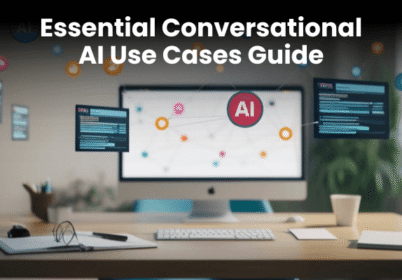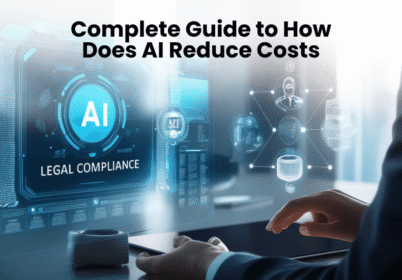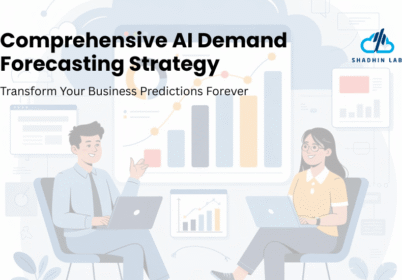Complete Guide to AI in Digital Marketing
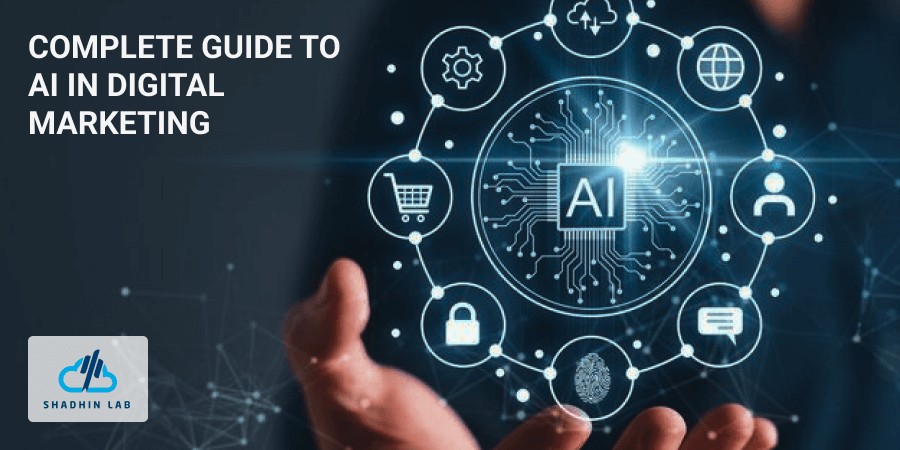
Table of Contents
Artificial Intelligence (AI) in digital marketing has emerged as a transformative force reshaping how businesses connect with customers today. The integration of AI in digital marketing empowers marketers to analyze vast data volumes and extract actionable insights with remarkable speed. Marketing teams across industries now harness these intelligent systems to automate repetitive tasks while delivering highly personalized customer experiences. This technology enables brands to scale their campaigns effectively while maintaining relevance across numerous customer touchpoints and platforms. Advanced algorithms continuously learn from consumer behaviors and optimize marketing strategies in real-time for maximum impact and conversion rates.
Our comprehensive guide explores how AI revolutionizes marketing through automation, personalization, predictive analytics, and enhanced customer engagement strategies. We will examine practical applications, measurable benefits, essential tools, implementation approaches, and emerging trends shaping AI-powered marketing technologies.
主なポイント:
- AI is revolutionizing digital marketing by enabling real-time personalization, automated campaigns, and data-driven decision-making across all customer touchpoints.
- Core applications include ad targeting, customer segmentation, predictive analytics, chatbots, content creation, and email marketing optimization.
- AI tools help marketers work smarter by reducing manual effort, improving targeting accuracy, and enhancing customer experiences at scale.
- The biggest benefits of AI in marketing are better ROI, cost efficiency, campaign automation, and personalized user engagement.
- Successful AI adoption requires clear goals, quality data, the right tools, and a balance between automation and human creativity.
- Future trends like hyper-personalization, emotion-aware AI, and AI-generated content will further reshape how brands connect with audiences.
Table of Contents
Key Applications of AI in Digital Marketing
AI technology has penetrated virtually every aspect of modern marketing operations with impressive versatility and adaptability. Campaign optimization represents a primary application where AI algorithms continuously test and refine marketing messages across platforms. These intelligent systems analyze performance metrics and automatically reallocate resources toward the highest-performing campaign elements for maximum efficiency. Customer segmentation has evolved dramatically through AI’s ability to identify complex patterns within diverse consumer datasets. Marketers now create hyper-targeted audience segments based on behavioral patterns rather than relying solely on basic demographic information.
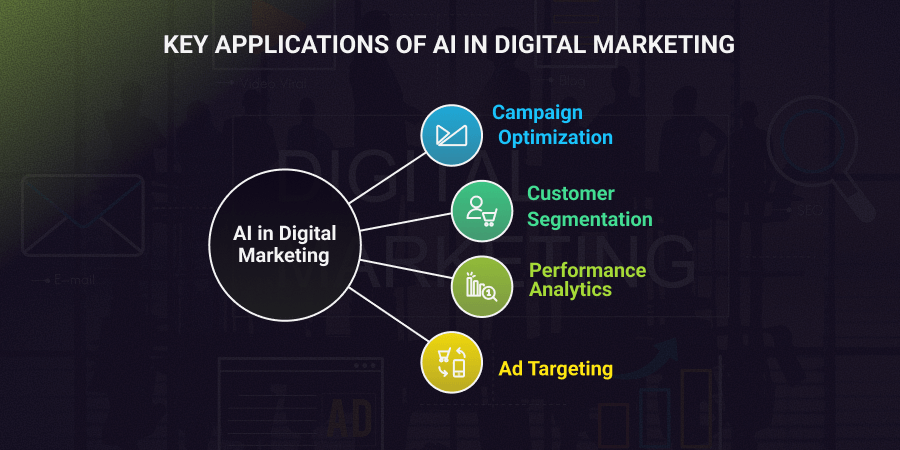
Performance analytics tools powered by AI process enormous datasets to extract meaningful insights beyond human analytical capabilities. These systems identify correlations between seemingly unrelated marketing variables and suggest strategic adjustments to improve campaign performance metrics. Ad targeting has become increasingly sophisticated through machine learning algorithms that predict consumer responsiveness to specific messaging approaches. These systems optimize ad placements across digital platforms and adjust bidding strategies in real-time based on performance data.
Key AI applications in digital marketing include:
- Real-time personalization that analyzes user behavior and delivers customized content tailored to individual preferences
- Chatbots and virtual assistants providing immediate customer service while gathering valuable interaction data
- Content creation tools generating marketing copy, social media posts, and video scripts based on strategic inputs
- Predictive analytics applications forecasting consumer behavior and market trends through historical data analysis
- Email marketing optimization for send times, subject lines, and content based on individual recipient behavior patterns
- Voice search optimization becoming increasingly important as AI assistants become primary interfaces for consumer inquiries
Benefits of AI in Digital Marketing
The strategic advantages of incorporating AI into digital marketing strategies extend across operational efficiency and enhanced customer experience domains. Improved targeting capabilities stand out as a primary benefit, with AI algorithms identifying high-value prospects with remarkable precision.
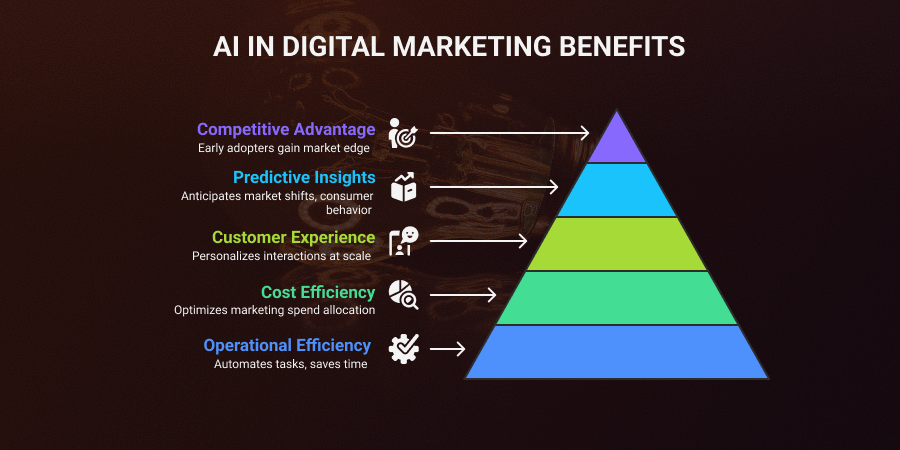
These sophisticated systems analyze hundreds of variables simultaneously to determine which consumers are most likely to convert into customers. Marketing teams achieve significant time savings through automation of repetitive tasks like data analysis and basic content creation. This automation allows creative professionals to focus on strategic initiatives rather than managing routine operational activities.
Cost efficiency represents another compelling advantage as AI optimizes marketing spend allocation across various channels. Automated bidding systems prevent overspending on underperforming platforms while maximizing exposure in high-converting digital environments. Customer experience improvements emerge naturally as AI enables truly personalized interactions at scale throughout the customer journey. Consumers receive relevant content and offers precisely when they need them, significantly increasing satisfaction and loyalty over time.
Predictive insights derived from AI analysis allow marketers to anticipate market shifts and consumer behavior changes. These forward-looking capabilities enable proactive strategy adjustments rather than reactive responses to unexpected market developments. Return on investment improvements typically follow AI implementation as campaigns become increasingly targeted and efficient over time. Many organizations report 20-30% performance improvements after deploying AI marketing solutions effectively across their operations.
Additional benefits include competitive advantage for early adopters, enhanced scalability without proportional resource requirements, and deeper measurement capabilities for attribution. AI systems continuously optimize creative elements and track complex multi-touch conversion paths across the entire customer journey. This acceleration of improvement cycles creates sustainable marketing advantages for organizations that implement these technologies effectively.
AI-Powered Tools for Digital Marketers
The marketplace for AI marketing tools has expanded dramatically with solutions addressing virtually every marketing function and need:
- Content generation platforms like Jasper, Copy.ai, and ContentBot create marketing copy from simple prompts
- Image and video generation tools including DALL-E, Midjourney, and Runway ML produce visual assets based on text descriptions
- Customer segmentation platforms such as Segment, Amplitude, and Mixpanel identify behavioral patterns and create actionable audience segments
- Predictive analytics tools like Pecan AI, DataRobot, and Obviously AI forecast customer behavior with increasing accuracy
Chatbot and conversational marketing platforms including Drift, Intercom, and ManyChat facilitate automated customer interactions while gathering valuable data. These intelligent systems handle routine inquiries while escalating complex issues to human representatives when necessary for resolution. Personalization engines such as Dynamic Yield, Optimizely, and Evergage deliver customized website experiences based on user behavior and preferences. These platforms test numerous content variations to identify optimal user experiences for different audience segments.
Email marketing automation tools like Klaviyo, ActiveCampaign, and Mailchimp incorporate AI for send time optimization and content personalization. These systems analyze recipient behavior patterns to maximize open rates and engagement metrics across diverse audience segments. Social media management platforms including Sprout Social, Hootsuite, and Buffer now offer AI-powered content recommendations and posting schedules. These tools analyze historical performance data to optimize social media strategy continuously for maximum engagement.
SEO and content optimization tools such as Clearscope, MarketMuse, and Surfer SEO analyze top-performing content and provide strategic recommendations. These platforms identify content gaps and optimization opportunities based on comprehensive competitive analysis and search trends. Ad optimization platforms like Acquisio, Wordstream, and Optmyzr automatically adjust bidding strategies and creative elements based on performance data. These systems reallocate marketing budgets in real-time to maximize conversion opportunities across campaigns.
Challenges and Limitations of AI in Digital Marketing
Despite impressive capabilities, AI marketing technologies face significant challenges that marketers must acknowledge and address proactively:
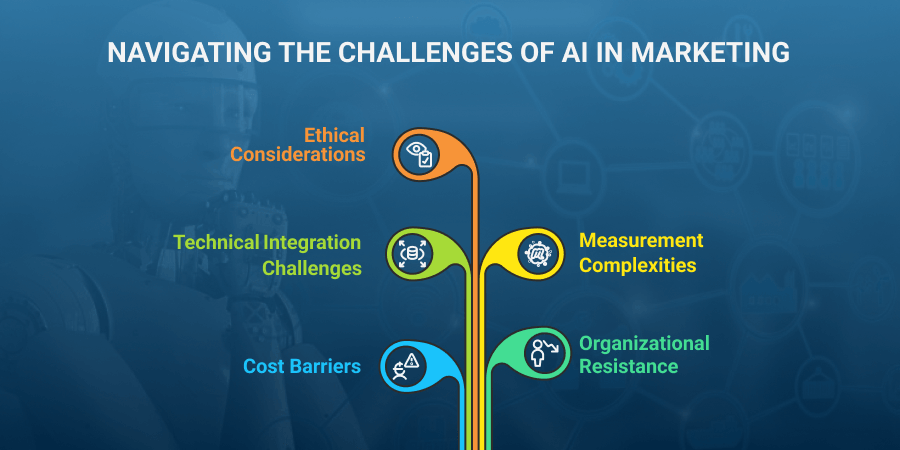
- Algorithm bias reflecting the prejudices present in training data, potentially excluding demographics or reinforcing harmful stereotypes
- Privacy concerns as consumers become increasingly aware of data collection practices amid regulations like GDPR and CCPA
- Data quality dependencies since AI systems perform only as well as their input data allows
- Creative limitations as AI struggles with truly original concept development and emotional nuance in content
- Implementation complexity that often surprises organizations underestimating technical requirements and integration challenges
Cost barriers exist particularly for smaller organizations with limited technology budgets and technical resources. Enterprise-grade AI marketing solutions require significant investment in both technology infrastructure and specialized talent acquisition. The democratization of these tools progresses steadily but adoption gaps between large and small organizations remain substantial. Organizational resistance frequently emerges as marketing teams worry about job displacement or devaluation of traditional marketing skills. Change management becomes crucial for successful AI implementation within established marketing departments.
Technical integration challenges arise when attempting to connect AI tools with existing marketing technology stacks. Many organizations struggle with data silos that prevent AI systems from accessing comprehensive customer information across touchpoints. Overreliance risks develop when marketers become excessively dependent on AI recommendations without maintaining strategic oversight. The most successful implementations maintain human judgment as the final decision authority while leveraging AI insights.
Measurement complexities make it difficult to isolate the specific impact of AI within broader marketing initiatives. Attribution models must evolve to properly value the contribution of AI-powered optimizations across the customer journey. Ethical considerations extend beyond privacy to include transparency about AI usage in customer interactions. Consumers increasingly expect clear disclosure when engaging with AI systems rather than human representatives.
Future Trends in AI for Digital Marketing
The evolution of AI in marketing continues accelerating with several emerging trends poised to reshape industry practices. Hyper-personalization represents the next frontier as AI systems develop increasingly granular understanding of individual preferences. Future marketing will move beyond broad segmentation to truly individualized experiences across all customer touchpoints. These sophisticated systems will anticipate customer needs based on contextual factors including location, weather, and recent life events.
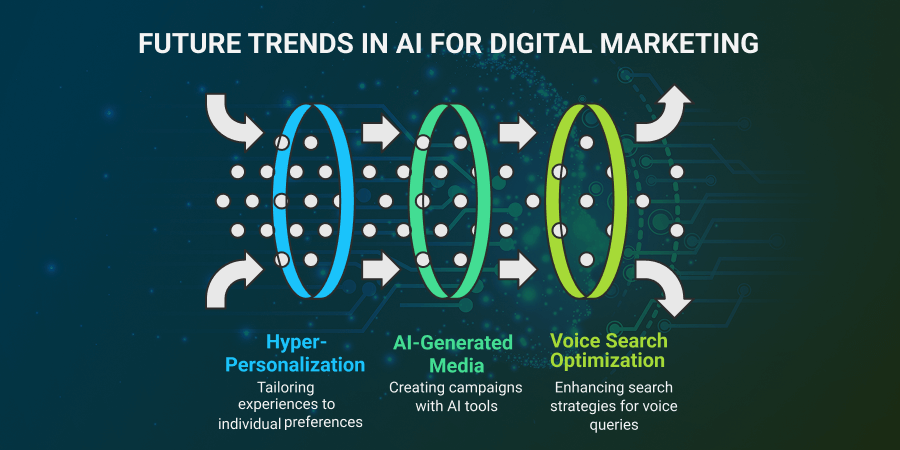
AI-generated media production capabilities continue advancing rapidly beyond basic content creation and optimization. Marketing teams will soon produce entire campaigns including videos, images, and interactive experiences through AI tools. Creative professionals will focus on strategic direction while AI handles production elements with increasing sophistication and quality. Voice search optimization becomes increasingly critical as consumers adopt smart speakers and voice assistants for everyday queries.
Future AI marketing trends include:
- Emotion-driven AI detecting subtle emotional signals and adjusting marketing approaches accordingly in real-time
- Predictive journey mapping anticipating customer needs before they explicitly express them
- Augmented reality experiences creating immersive marketing opportunities accessible through everyday devices
- AI-powered decision engines autonomously managing complex marketing campaigns with minimal human oversight
- Privacy-preserving AI techniques extracting marketing insights without requiring excessive personal data collection
Conversational marketing will evolve beyond simple chatbots to truly natural interactions across multiple channels. These systems will maintain context across conversations and provide seamless transitions between automated and human assistance. Cross-platform identity resolution will improve dramatically through AI analysis of behavioral patterns and signals. This capability will enable consistent personalization even as consumers move between devices and platforms throughout their daily activities.
How to Integrate AI into Your Marketing Strategy
Successful AI implementation requires systematic planning rather than haphazard adoption of trending technologies without strategic purpose. Begin with comprehensive assessment of current marketing processes and identification of specific pain points. Prioritize areas where AI could deliver the most significant improvements based on business objectives and available data. This targeted approach prevents resource dispersion across too many simultaneous initiatives.
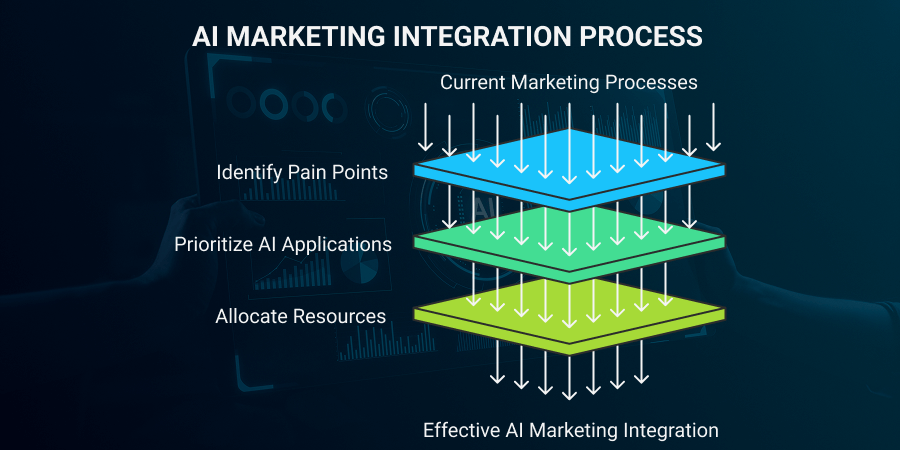
Steps for effective AI marketing integration:
- Choose appropriate tools based on specific marketing needs rather than pursuing the most advanced technologies
- Prepare your team through training and clear communication about implementation goals and benefits
- Create cross-functional implementation teams including marketing, IT, and data science perspectives
- Establish data readiness through auditing existing information sources and addressing quality issues
- Develop clear governance policies regarding data usage, privacy compliance, and ethical guidelines
- Implement in phases with clear success metrics for each stage rather than attempting comprehensive transformation
Maintain human oversight throughout implementation to ensure brand consistency and strategic alignment with business goals. The most effective AI marketing applications augment human creativity rather than attempting to replace it entirely. Establish regular review processes for AI-generated content and recommendations before customer deployment. Create feedback loops where human insights improve AI performance through supervised learning approaches.
Develop a long-term AI roadmap aligned with broader marketing strategy and business objectives. This planning prevents reactive technology adoption and ensures sustainable competitive advantage over time. Consider both current capabilities and emerging technologies when establishing this strategic vision. Allocate resources appropriately between maintaining existing AI applications and exploring new opportunities.
結論結論
AI in digital marketing represents a fundamental shift in how brands connect with consumers through data-driven intelligence. The technology enables unprecedented personalization, efficiency, and predictive capabilities across the entire marketing spectrum. Organizations embracing these capabilities gain significant advantages in customer understanding and engagement while optimizing resource allocation. The most successful implementations balance technological capabilities with human creativity and strategic oversight.
Marketing leaders must approach AI adoption strategically rather than pursuing technology for its own sake. Clear business objectives, appropriate tool selection, and systematic implementation planning determine success outcomes. Data quality, team readiness, and ethical considerations require careful attention throughout the implementation process. The future belongs to organizations that effectively combine AI efficiency with authentic human connections.
Experimentation remains essential as AI marketing technologies continue evolving at rapid pace. Organizations should establish innovation frameworks that encourage controlled testing of emerging capabilities. This approach balances exploration of new possibilities with protection of established marketing performance. The competitive landscape increasingly favors those who effectively leverage AI while maintaining distinctive brand identity and authentic customer relationships.
よくある質問
What are the most accessible AI marketing tools for small businesses?
Several affordable AI marketing tools provide significant value without requiring enterprise-level investment. Content creation platforms like Copy.ai and Jasper offer free or low-cost tiers for basic marketing copy generation. Email marketing platforms including Mailchimp and ActiveCampaign provide AI-powered features within accessible subscription plans. Social media management tools like Buffer and Hootsuite incorporate AI recommendations at reasonable price points for small organizations.
How can marketers address privacy concerns when implementing AI?
Marketers should adopt transparent data practices and clearly communicate how consumer information informs AI applications. Implement strong data governance policies that comply with relevant regulations like GDPR and CCPA. Provide straightforward opt-out mechanisms for consumers who prefer not to participate in AI-powered marketing programs. Consider privacy-preserving AI techniques that derive insights from aggregated data rather than individual profiles.
What skills should marketing teams develop to work effectively with AI?
Marketing professionals should develop basic data literacy and understanding of AI capabilities and limitations. Analytical thinking becomes increasingly valuable for interpreting AI-generated insights and recommendations. Creative professionals benefit from understanding how to provide effective direction to AI content generation tools. Project management skills help coordinate cross-functional AI implementation teams including technical and marketing perspectives.
How can organizations measure the ROI of AI marketing investments?
Establish clear baseline metrics before implementing AI solutions to enable accurate before-and-after comparisons. Track specific key performance indicators directly impacted by AI implementation rather than general marketing metrics. Consider both efficiency gains (cost savings, time reduction) and effectiveness improvements (conversion rates, customer lifetime value). Implement attribution models that properly account for AI contributions across the customer journey.
What is the appropriate balance between AI automation and human creativity in marketing?
The optimal balance leverages AI for data analysis, personalization, and routine content production while maintaining human direction for strategy. Humans should establish brand voice, emotional positioning, and campaign objectives while AI optimizes execution elements. Regular review of AI outputs ensures alignment with brand standards and strategic goals. The most effective approach treats AI as a collaborative tool rather than a replacement for human creativity.
Shaif Azad
Related Post
売上向上につながる対話型AIのユースケース
Are you frequently considering how technology could revolutionize your business operations? Conversational AI use cases are...
AIによるコスト削減の仕組み:ビジネス最適化ガイド
Are you lying awake wondering how your business can survive rising operational costs? Have you watched...
AIが需要予測の精度と意思決定をどのように向上させるか
Are you tired of watching your inventory costs spiral out of control while customers walk away...

